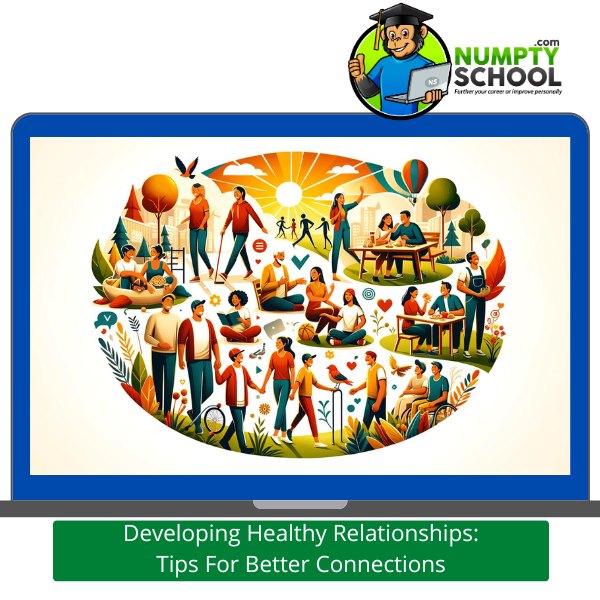Developing Healthy Relationships: Tips For Better Connections

Introduction
Healthy relationships form the cornerstone of a fulfilling life. Whether it’s with family, friends, or romantic partners, these connections contribute to our happiness, well-being, and overall satisfaction. In this article, we’ll explore the fundamental aspects of fostering healthy relationships and provide practical tips for nurturing them.
Communication is Key
Effective communication lies at the heart of every successful relationship. It involves not only expressing oneself but also actively listening to others. By communicating openly and honestly, partners can strengthen their bond and resolve conflicts more effectively. Techniques such as using “I” statements, practicing empathy, and avoiding blame can facilitate productive conversations.
Building Trust
Trust serves as the foundation of any healthy relationship. It develops over time through consistent actions and transparent communication. By demonstrating reliability, integrity, and loyalty, individuals can cultivate trust with their partners. Honesty, both with oneself and others, is paramount in building and maintaining trust.
Respect and Boundaries
Respect forms the basis of mutual admiration and appreciation in relationships. It involves recognizing and honoring each other’s boundaries, opinions, and feelings. Respecting boundaries means acknowledging and accepting differences while refraining from judgment or control. Mutual respect fosters a sense of safety and security within the relationship.
Support and Encouragement
Partners in healthy relationships provide each other with unwavering support and encouragement. Whether through words of affirmation, acts of kindness, or simply being present, individuals can bolster their partner’s confidence and well-being. Emotional support during challenging times and celebrating successes together strengthens the bond between partners.
Conflict Resolution
Conflict is inevitable in any relationship, but it’s how partners navigate it that determines the health of their bond. Healthy conflict resolution involves active listening, empathy, and a willingness to compromise. By addressing disagreements calmly and constructively, partners can deepen their understanding of each other and strengthen their connection.
Quality Time Together
Spending quality time together is essential for maintaining intimacy and connection in relationships. Engaging in meaningful activities, whether it’s shared hobbies, adventures, or simply enjoying each other’s company, strengthens the bond between partners. Balancing individual interests with shared experiences fosters a sense of closeness and connection.
Showing Appreciation
Expressing gratitude and appreciation is vital for nurturing a healthy relationship. Small gestures, such as saying “thank you” or expressing admiration, can go a long way in making partners feel valued and loved. Acknowledging each other’s efforts and qualities strengthens the bond and fosters a positive atmosphere within the relationship.
Maintaining Independence
While being part of a couple, it’s crucial to maintain a sense of independence and individuality. Encouraging each other’s hobbies, interests, and personal goals fosters personal growth and fulfillment. Respecting each other’s need for space and autonomy strengthens the relationship by fostering a healthy balance between togetherness and independence.
Handling Differences
Differences are inevitable in any relationship, but they don’t have to be divisive. Embracing diversity and accepting each other’s unique perspectives fosters understanding and empathy. By finding common ground and respecting each other’s opinions, partners can navigate differences with grace and maturity.
Cultivating Empathy
Empathy is the ability to understand and share another person’s feelings and experiences. Cultivating empathy in a relationship involves active listening, perspective-taking, and emotional validation. By showing empathy and compassion towards each other, partners can deepen their connection and foster a sense of intimacy.
Healthy Conflict
Viewing conflict as an opportunity for growth rather than a threat to the relationship is essential for its health. Constructive criticism and feedback can help partners learn and grow together. By approaching disagreements with a growth mindset and a willingness to learn from each other, couples can turn conflict into an opportunity for deeper understanding and connection.
Growth Mindset
A growth mindset is essential for the continuous improvement of a relationship. Embracing challenges together and celebrating successes fosters resilience and strengthens the bond between partners. By viewing obstacles as opportunities for growth and learning, couples can navigate the ups and downs of life with optimism and unity.
Seeking Help When Needed
Recognizing when assistance is necessary and seeking help is a sign of strength, not weakness. Whether it’s couples therapy, counseling, or support from friends and family, reaching out for help can provide valuable insights and guidance. By prioritizing the health and well-being of the relationship, partners can overcome challenges and strengthen their connection.
Conclusion
Developing healthy relationships requires effort, commitment, and a willingness to communicate openly and honestly. By prioritizing trust, respect, support, and empathy, partners can nurture a strong and fulfilling bond that withstands the test of time. Investing in the health of your relationships not only enhances your well-being but also enriches your life with love, connection, and happiness.
FAQs:
How can I improve communication in my relationship?
Practice active listening, express yourself honestly, and be open to feedback from your partner.
What should I do if my partner and I have different interests?
Find a balance between shared activities and individual hobbies, respecting each other’s interests and passions.
How do I know if my relationship is healthy?
Look for signs of trust, respect, communication, support, and empathy in your relationship.
Is it normal to have disagreements in a relationship?
Yes, disagreements are a natural part of any relationship. It’s how you handle them that matters.
When should I consider couples therapy?
Consider couples therapy if you’re facing persistent challenges in your relationship that you’re unable to resolve on your own.



